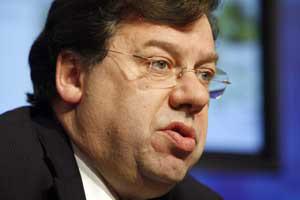And so it's agreed - we will change nothing

The absurd, menacing consensus among our political parties means a chance to improve society is being missed, writes Vincent Browne.
The idea of a national government is absurd, unless, that is, the establishment parties, Fianna Fáil, Fine Gael, Labour and the Greens, agree on everything. And there is reason to suppose they do agree on everything – at least on all essentials – aside from which of them should partake in the spoils of office for another four or five years.
And there is reason to suppose this is very menacing indeed. For the crisis affords us an opportunity to change a great deal here: on the kind of society we have; on the distribution of its resources; on how our political system works; in general how the citizen fits in to the State.
But, alas, it seems there is a consensus to ignore much of this, a consensus merely to fix up the old system and then get on with the old system, with a few regulatory tweaks here and there, along with a few optics to give the impression of change.
The consensus seems to be that we can fix what is wrong by cutting social welfare some more, possibly by a billion or two; by extending the tax net downwards to those considered too poor until now to be required to pay tax; by closing off a few tax breaks here and there without frightening any horses. Maybe some increase in income tax rates on both the standard and top levels, but again no frightening of the horses. A percentage or two on VAT and keep the fingers crossed.
Lots of guff about protecting "the vulnerable", masking the further immiseration of the already miserable. Oh, and cuts in overseas development aid. Pity about that, especially as Brian Cowen and his minions, while he was in foreign affairs, went around the world in 2002 promising to meet the 0.7 per cent of GNP target in overseas development aid – by 2005 was it? This was when we were engaged in the vanity project of trying to get elected to the UN Security Council and were currying votes among the less developed countries of the world.
There is an alternative agenda, one to fix the deficit crisis and to fix the political system and to fix society. Crucial to that alternative agenda is changing the relations of power, income and wealth in society, and using the crisis to achieve that.
Yes, we need to close the €18.5 billion budget gap in a few years. We can do it either by having the richer section of society pay to fill in the gap or demand that everyone pays to fill the gap, including those who can't pay and who had no part in causing the gap. Because of the incompetence of our business elite, our banking elite, our professional elite and our political elite we are in this mess. All of these elites benefited hugely from the bubble that caused this mess and they are the ones that should pay most for the rectifying of it.
The alternative agenda involves getting rid of many of the tax breaks, including all the tax breaks relating to pensions and superannuation payments, which cost the exchequer €3 billion a year. The privilege accorded to corporations has to yield too. A mere 2.5 percentage-point rise in the corporate tax rate would yield €0.6 billion per year. Everyone earning over €150,000 in the public serviced has got to take a big knock back to €150,000, including the hospital consultants with their super contracts. Plus a third income tax rate for high earners, a property tax for high earners, and more.
But that's not all.
Doesn't the crisis show the ineptitude and irrelevance of our political system, whereby our elected representatives are rendered mere onlookers, instead of agents of change and correction? And the people are excluded entirely. A legal system that is devised for lawyers and excludes the ordinary people in its language, customs, rituals, costs (above all costs) and carry-on? Other professions – dentists, medical doctors, pharmacists, vets, accountants, stockbrokers – suffused with self-importance, self-interest and self-enrichment. A legal system that sees criminality only among the working class. Still.
Isn't this a time to change all that?
There may be a way to change that through what is known as civil society. Ordinary people coming together, outside the political arena, to formulate ideas for change and then to demand change. Meetings have been going on around the country over the past few months generating ideas and support. This is to lead to a conference in the RDS on Saturday, October 30th, to which everyone is invited.
There seems to be a separate crisis, a crisis of legitimation. There is little faith in politics, in any of the parties and in any of the politicians, even though we are the ones who elected them. The problem is the political system is closed. We are forced into the Tweedledum and Tweedledee options and have no means of changing that or getting around that.
That could be our gravest crisis.
